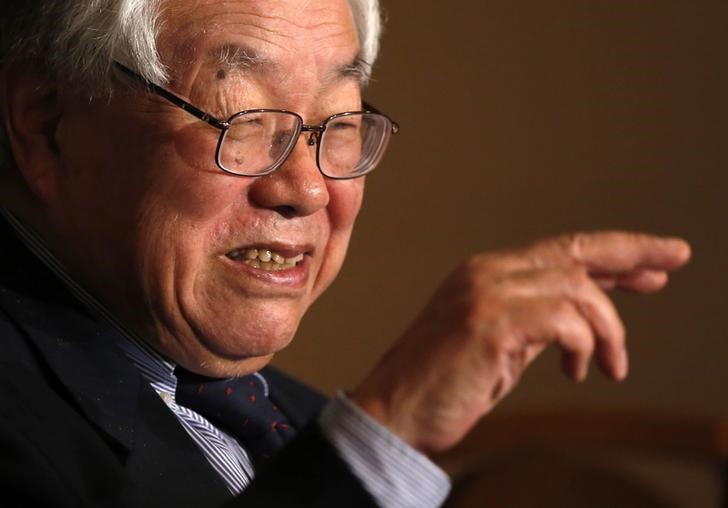By Kaori Kaneko
TOKYO (Reuters) - Japan should not resort to "helicopter money," which would see the central bank directly underwriting public debt because that could stoke runaway inflation, a key adviser to Prime Minister Shinzo Abe said on Thursday.
But Koichi Hamada, an emeritus professor of economics at Yale University, said deploying fiscal and monetary stimulus measures simultaneously as a "one-off" approach could be effective in reviving the economy.
Some investors speculate that Japan might decide to provide "helicopter money" - a term coined by American economist Milton Friedman and which gained popularity after former Federal Reserve Chairman Ben Bernanke cited it in a speech in 2002, when talking about how central banks might finance government budgets directly as a way to fight deflation.
Hamada said he was opposed to the idea of institutionalising "helicopter money" in Japan, or revising the law so that the BOJ can directly underwrite government debt instead of buying them from the market.
"There's a chance Japan will lose control of inflation," Hamada told Reuters in a phone interview.
"To establish a system in Japan that allows the government to print as much money as it wants would lead to serious consequences in the future," he said.
Market speculation that Japan may resort to helicopter money heightened after Bernanke met Abe on Tuesday. But Hamada, who was present at the meeting, said Bernanke made no mention of helicopter money.
Abe is set to announce an economic stimulus package to spur growth with lawmakers calling for spending of at least 10 trillion yen ($95.6 billion).
The BOJ will hold a rate review on July 28-29 and debate whether risks, such as weak consumption and sliding inflation, have heightened enough to warrant additional monetary stimulus.
Hamada said that while the BOJ has already deployed aggressive policies including negative interest rates, there may be room to do more to maximise the effect of fiscal stimulus.
"If it is just once or twice, I think it is acceptable to adopt fiscal and monetary stimulus steps simultaneously, so that they mutually reinforce each other," he said.
Hamada said it was difficult for Japan to conduct currency intervention to arrest excessive yen rises, and that using monetary policy was the more "orthodox" way to address unwelcome yen appreciation.
He also defended the premier's "Abenomics" stimulus policies aimed at eradicating deflation, saying that the media was fanning excessive pessimism over the country's growth prospects and making Japanese companies and investors wary of investing.
($1 = 104.6200 yen)
